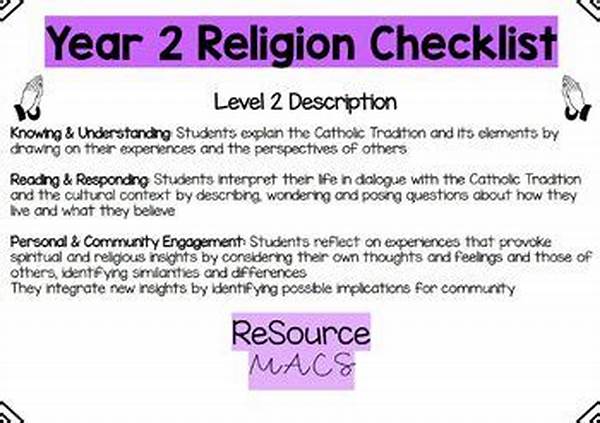Hey there! Have you ever wondered how religious outreach programs measure their success or areas for improvement? Well, that’s where an assessment framework comes into play. This framework is like a guiding light that helps organizations evaluate their programs’ effectiveness, ensuring they are serving their purpose and delivering meaningful experiences to communities.
Understanding the Basics of an Assessment Framework
Now, let’s dive into the core of what an assessment framework for religious outreach programs really is. Essentially, this framework is a set of criteria and methods used to evaluate the programs. It’s like having a roadmap that guides us in understanding how well a program is doing. The framework assesses different aspects such as community engagement, program impact, and long-term sustainability. It’s important because no one wants to invest time and resources into something without knowing if it’s truly making a difference, right? This assessment framework ensures that religious outreach programs are not only effective but also relevant to the people they aim to serve. By continuously evaluating and refining these programs, organizations can ensure their messages resonate, meet community needs, and bring about positive change. So, if you’re part of an outreach program or just curious, understanding this framework can really give you some valuable insights.
Key Components of the Framework
An assessment framework for religious outreach programs has several crucial elements:
1. Goals and Objectives: Clarity on what the program aims to achieve.
2. Community Needs Assessment: Understanding what the community truly needs.
3. Impact Analysis: Evaluating the actual effects of the program.
4. Feedback Mechanisms: Collecting and analyzing participant feedback.
5. Sustainability Measures: Ensuring the program’s long-term viability.
Implementing the Framework Effectively
Implementing an assessment framework for religious outreach programs is like planting seeds for growth. Think about it as a process where every step counts toward a bigger goal. It begins with setting clear objectives. What are you aiming to achieve with your religious outreach programs? Without clear goals, it’s like setting sail without a destination. After goals are defined, understanding the community you’re serving becomes crucial. Spend time learning about their values, needs, and challenges. This step helps align the program’s goals with community expectations, ensuring relevance and impact. Once your program is rolling, consistently gather feedback. Encourage open and honest communications, so you hear not just the positives but also areas needing improvement. Feedback acts as a valuable compass guiding the program’s adjustments. Lastly, evaluate sustainability measures. You want your efforts to have a lasting impact, don’t you? This involves regular reviews of resources and processes to ensure continuity and growth over time.
Challenges and Solutions with the Framework
When working with an assessment framework for religious outreach programs, several challenges might arise:
1. Resource Limitations: Assessing with minimal resources can be tough, but prioritizing essential evaluations helps.
2. Cultural Sensitivity: Programs must respect diverse beliefs, and continuous education can aid understanding.
3. Data Gathering: Collecting accurate data is crucial. Using tech solutions can streamline this.
4. Adaptability: Programs must evolve with changing community needs. Staying informed ensures relevance.
5. Motivating Stakeholders: Engaging stakeholders through storytelling and evidence of impact can boost participation.
Building a Sustainable Outreach Program
Creating a sustainable assessment framework for religious outreach programs is an ongoing journey. Picture it like growing a garden; you have to nurture it patiently. Start by continuously refining your objectives. Maybe you’d planned a specific activity that isn’t resonating? Be open to change and innovation. Flexibility can make all the difference in achieving impact. Regularly check in with the community. Their feedback helps you adapt to their evolving needs and expectations. Plus, engaging directly with community members can provide invaluable insights. It’s also vital to build a team that’s committed to the mission. Their passion becomes infectious and contributes significantly towards the program’s success. Training plays a key role too. Equip your team with the skills to adapt, engage, and implement changes effectively. Remember, building sustainably means fostering partnerships with other organizations and networks. Collaboration often opens doors to new opportunities and support.
Future Prospects of Religious Outreach Programs
The future of religious outreach programs looks promising, especially with a well-crafted assessment framework in play. Picture how exciting it is to see tangible changes taking place! Programs are gradually becoming more innovative, integrating technology to reach wider audiences and enhance engagement. Isn’t it fascinating to imagine a virtual gathering bringing communities closer in ways traditional approaches couldn’t? As technology evolves, so does our potential for outreach. A robust assessment framework for religious outreach programs is poised to harness these advancements, ensuring programs adapt and prosper. Moreover, inclusivity is becoming central to outreach, breaking barriers and ensuring all voices are heard. Programs are adopting more inclusive approaches by appreciating diverse perspectives and enriching their initiatives. Finally, the focus on continuous improvement through this framework ensures that outreach programs remain relevant, impactful, and resilient amidst changing societal landscapes.
Reflecting on the Importance of an Assessment Framework
Ultimately, there’s no doubt that an assessment framework for religious outreach programs is integral to their success. It enables decision-makers to identify what’s working, refine what isn’t, and evolve to meet the needs of the people they serve. Incorporating feedback from all stakeholders ensures more holistic, effective outreach initiatives. Remember, it’s a step-by-step journey to create meaningful impact in the communities. In the grand scheme, a well-implemented assessment framework contributes significantly to the program’s effectiveness, sustainability, and ability to create meaningful connections. By understanding these frameworks, those involved can ensure they’re contributing to a brighter, more harmonious future.
